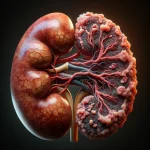What is Kidney Disease?
Kidney disease refers to the gradual and often permanent deterioration of the kidneys’ filtering structures, known as nephrons. In a healthy state, these two bean-shaped organs meticulously cleanse the bloodstream, sifting out metabolic waste products and excess fluids to be expelled as urine. They also perform other vital roles, such as producing hormones that regulate blood pressure, stimulating the production of red blood cells, and maintaining bone health. When kidney disease sets in, these nephrons become damaged and progressively lose their functional capacity.
This decline in performance means that dangerous levels of waste and fluid can accumulate in the body. The condition, most commonly referred to as Chronic Kidney Disease (CKD), is categorized into five stages. The progression is measured by the remaining filtering ability. In the early stages, the damage may be slight with few noticeable signs, but as the disease advances to its later stages, the impairment becomes severe. The final stage, end-stage renal disease (ESRD), represents a near-total loss of kidney function, at which point life can only be sustained through dialysis or a kidney transplant.
Causes:- Uncontrolled High Blood Pressure (Hypertension): The kidneys contain a dense network of tiny, fragile blood vessels. When blood pressure is persistently high, it creates a powerful, damaging force that pounds against these delicate vessels. Over years, this relentless pressure causes the filtering units (glomeruli) to become scarred and hardened, progressively destroying their ability to cleanse the blood.
- Sustained High Blood Sugar (Diabetes): A chronic excess of glucose in the bloodstream is toxic to the kidneys' filtering apparatus. The high sugar levels alter the structure of the filtering membranes, causing them to become abnormally "leaky" and allowing essential proteins to spill into the urine. This process, combined with other metabolic stresses, leads to progressive scarring and the ultimate failure of the filtration units.
- Direct Inflammation of the Kidneys (Glomerulonephritis): This condition involves a misdirected attack by the body's own immune system against the glomeruli. The resulting inflammation directly damages the filtering mechanisms, sometimes leading to a rapid decline in kidney function.
- Inherited Structural Defects (Polycystic Kidney Disease): In some individuals, a genetic flaw causes numerous cysts to grow within the kidneys. As these fluid-filled sacs enlarge over a lifetime, they physically crowd out and destroy healthy kidney tissue, steadily reducing the organ's overall capacity.
- Physical Obstruction of Urine Flow: Any condition that blocks the urinary tract for a prolonged period, such as an enlarged prostate, kidney stones, or certain tumors, can cause urine to back up into the kidneys. This back-pressure creates a damaging internal environment that can lead to permanent loss of function if not corrected.
- A Diagnosis of Diabetes: People with either type 1 or type 2 diabetes represent the single largest risk group. The metabolic disruptions inherent to this condition create a long-term hostile environment for the kidneys' delicate vascular network, making them exceptionally vulnerable to cumulative damage.
- A History of High Blood Pressure: Having poorly controlled hypertension is a major determinant of risk. This condition places the entire circulatory system, including the crucial blood supply to the kidneys, under constant mechanical stress, which accelerates wear and tear on the filtering units.
- A Genetic Link to Kidney Failure: Individuals with a close biological relative, such as a parent or sibling, who has experienced end-stage renal disease have an increased personal susceptibility. This points to an inherited predisposition that can make the kidneys less resilient to other stressors.
- Advancing Age: Those over the age of 60 face a greater likelihood of developing the disease. A gradual decline in the number of functioning nephrons is a normal part of aging, which lowers the kidneys' overall reserve capacity.
- Specific Ethnic Backgrounds: Certain populations, including individuals of African, Hispanic, or Native American descent, experience disproportionately higher rates of kidney failure. This is often linked to a higher prevalence of diabetes and hypertension within these communities.

